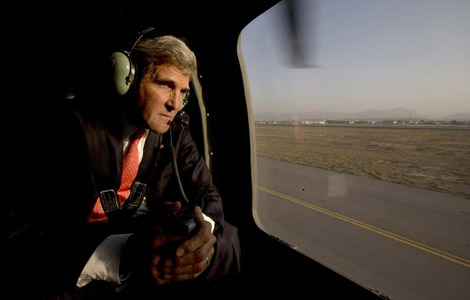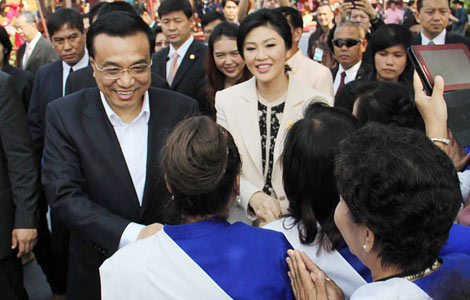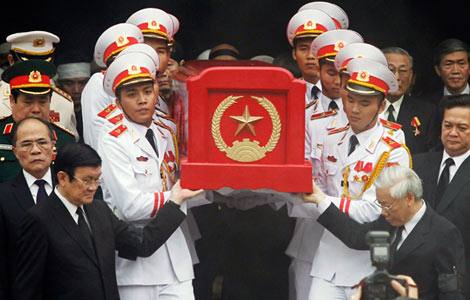Dispute on immunity for US troops blocks pact
Updated: 2013-10-13 09:08
(Agencies)
|
||||||||
|
 |
|
US Secretary of State John Kerry takes off in a helicopter after arriving on an unannounced visit to meet with Afghan President Hamid Karzai, in Kabul October 11, 2013. [Photo/Agencies] |
The pact would determine, among other things, how many US troops remain in Afghanistan after 2014 when most foreign combat troops are due to exit.
US officials had previously said they wanted the pact finalised by the end of October. Kerry's visit was seen as a last-ditch effort to push the deal through before the deadline.
The United States is insisting it cannot agree to a deal unless it is granted the right to try US citizens who break the law in Afghanistan at home in the United States.
Karzai said that was beyond the scope of his government to decide on the issue, calling it a question of "jurisdiction", and that it would have to be put to the country's Loya Jirga, an assembly of elders, leaders and other influential people.
"We need to say that if the issue of jurisdiction cannot be resolved, then unfortunately there cannot be a bilateral security agreement," Kerry said at a news conference, stressing an agreement was otherwise essentially in place.
Karzai said the talks had focused on protecting Afghan sovereignty and that major differences had been resolved, including a US request to to run independent counter-terrorism missions on Afghan territory.
Such operations carried out by the US have long infuriated the Afghan president, who had been demanding the US agree to share intelligence instead.
Karzai said the US snatching of a senior Pakistani Taliban commander was an example of the kind of action that Afghanistan wanted to avoid.
"This is an issue that we have raised in earnest with the United States in the past few days as we have all previous occasions of such arrests in which the Afghan laws were disregarded," Karzai said, referring to the capture of commander Latif Mehsud.
"Therefore our discussion today in particular has been focused on making sure that through the bilateral security agreement such violations are not repeated."
Kerry attributed the complaint to a misunderstanding.
"We followed the normal procedures that the United States follows ... we did what we are supposed to do," he said.

 Chinese education for Thai students
Chinese education for Thai students
 Djokovic retains Shanghai Masters title
Djokovic retains Shanghai Masters title
 Working group to discuss sea issues
Working group to discuss sea issues
 Draft regulation raises fines for polluters
Draft regulation raises fines for polluters
 Other measures for the capital to become green
Other measures for the capital to become green
 Colombian takes wingsuit crown
Colombian takes wingsuit crown
 Vietnam buries heroic general
Vietnam buries heroic general
 Road to clean air starts with new energy vehicles
Road to clean air starts with new energy vehicles
Most Viewed
Editor's Picks

|

|

|

|

|

|
Today's Top News
No new findings over Arafat's death: official
Chinese firm joins UK airport enterprise
Senate leader 'confident' fiscal crisis can be averted
Working group to discuss sea issues
Man hospitalized years after amputating own leg
Detained US citizen dies in Egypt
Senate leads hunt for shutdown and debt deal
Draft rule raises fines for polluters
US Weekly

|

|








